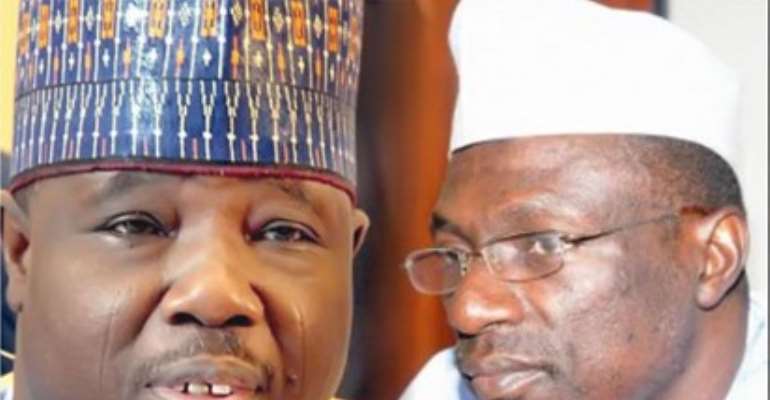Ondo guber: Sheriff working against PDP, says Makarfi

Chairman of the Peoples Democratic Party, PDP, Caretaker Committee, Senator Ahmed Makarfi, has accused factional leader of the party, Senator Ali Modu-Sheriff, of working for the All Progressives Congress, APC, to win the forthcoming governorship election by supporting Mr. Jimoh Ibrahim, instead of the declared winner of the primary, Mr. Eyitayo Jegede, SAN.
Makarfi, who spoke with journalists in Kaduna, also, accused Sheriff of breaching a Memorandum of Understanding, MoU, the two camps reached to break the impasse that had made the former ruling party divided along Makarfi and Sheriff camps.
He said: 'Most members and supporters of our great party believe that Senator Sheriff is working for the smooth victory of the APC. That is why he is supporting Ibrahim Jimoh, who is not popular in the state. The APC is ready to do anything to win Ondo, and our party will not be surprised to see such a scheme being hatched.
'We gave INEC relevant notices as stipulated by law. They observed our primaries and they took our nomination. It was reported that the other side (Sheriff's faction) did primaries at midnight in Ibadan. It was not covered by INEC or any authority for that matter. So, if a court of law gives INEC some orders contrary to our well organised primary election that produced Jegede, it is unfortunate. No such court of law, in the first instance, should give such an order.
'They are ignoring all the other laws relating to regulations and how candidates should emerge. Be that as it may, it has been our principle not to personalize issues because our judicial system provides for appeal process and we have appealed. And we have absolute confidence that the appellate court should be able, before the election date, to determine the legitimate candidate of the PDP. We are still confident that Jegede, the properly nominated candidate by our party men and women from Ondo State will be the name to stand for the election as a PDP candidate for Ondo.'
On the MoU, he said: 'What we agreed was that the other side (Sheriff's faction) will join the caretaker committee (Makarfi's committee). And that was the basic agreement that was reached. We should set up an equal number of party men and women that would sit down and look at the modality for integrating the two sides into a new caretaker committee and also draw the modality for the withdrawal of all court cases or consensual settlement of the cases.
'We agreed that in withdrawing all cases, let it be something that we all consent to so as to prevent future litigation. The committee was to be for 12 from both sides, later it was Ali Modu Sheriff himself who thought that we should expand it to 14 each because his thought was that some members of the caretaker committee ought to have been members of the new committee because they know where we are and they can add to the new committee in making input. From his own committee members, he will also bring two to also join the other people. We said that it was a good idea.
'Later, I was the one that sent a message that we needed to expand it to 15 because instead of two governors we wanted to include three governors in order to carry everybody along. So, that was how we hit the figure 15 on each side.' And the issue now became who will chair that committee and the term of reference. On who to chair the committee there were names that were mentioned.
'In my opinion, I thought of the person who was able to convene us without dispute should be able to chair the committee. In suggesting any other name you don't know how it would be received by other people.
'Modu Sherrif suggested former President Goodluck Jonathan. And I said he had wanted to do similar thing before and he was advised against it and that he shouldn't be dragged into it, more so, we don't know how it will end up. If it ends up well, fine and well. Supposing it doesn't end up well, we would have succeeded in bringing down his stature as PDP immediate past President. It will mean that he is involved in something which later failed. It wasn't wise to get him involved in such issues, we reasoned together. We actually felt that it will be better that he plays an advisory role and not a central role. And so, we didn't decide on who to take the position, it was opened for discussion. But, the key issue where we had problem was the issue of terms of reference.'
